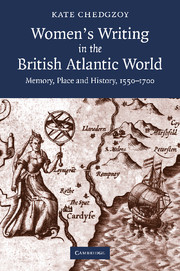Book contents
- Frontmatter
- Contents
- Acknowledgements
- Introduction: ‘A place on the map is also a place in history’
- Chapter 1 ‘The rich Store-house of her memory’: The metaphors and practices of memory work
- Chapter 2 ‘Writing things down has made you forget’: Memory, orality and cultural production
- Chapter 3 Recollecting women from early modern Ireland, Scotland and Wales
- Chapter 4 ‘Shedding teares for England's loss’: Women's writing and the memory of war
- Chapter 5 Atlantic removes, memory's travels
- Conclusion
- Notes
- Bibliography
- Index
Chapter 1 - ‘The rich Store-house of her memory’: The metaphors and practices of memory work
Published online by Cambridge University Press: 22 September 2009
- Frontmatter
- Contents
- Acknowledgements
- Introduction: ‘A place on the map is also a place in history’
- Chapter 1 ‘The rich Store-house of her memory’: The metaphors and practices of memory work
- Chapter 2 ‘Writing things down has made you forget’: Memory, orality and cultural production
- Chapter 3 Recollecting women from early modern Ireland, Scotland and Wales
- Chapter 4 ‘Shedding teares for England's loss’: Women's writing and the memory of war
- Chapter 5 Atlantic removes, memory's travels
- Conclusion
- Notes
- Bibliography
- Index
Summary
Early modern women's memory work was at once a practice of everyday ethical and intellectual life, and a profound influence on their writing across a variety of forms and genres. This chapter examines the disciplines, metaphors and techniques that informed it, beginning with Lady Anne Clifford, both an exemplary and an exceptional figure in relation to early modern women's memory work. The thoroughness of Clifford's commitment to undertaking acts of memory which wove together personal and public, and her possession of the material resources to make this possible, were undoubtedly unusual. But the sheer range of her memorial activities represents many of the ways in which women engaged with memory in this period. These embrace the articulation of emotionally charged memories, which are meditated on, interpreted, and have continuing affective resonance; memory as a resource for thinking and writing and communicating; recollection and archiving as processes of mnemonic training and discipline; a commitment to the recollection and reinterpretation of the past; and a desire to be remembered in the future.
Combining intensely personal motives with a highly politicized concern with history, Anne Clifford's memorial activities took a number of material and textual forms. Her travels and building activities inscribed on the landscape the visible, chorographic memory of intersecting personal and public histories. Refurbishing six medieval castles built by her ancestors, and undertaking numerous other projects of architectural patronage, she set in stone her awareness of her standing in her family's posterity.
- Type
- Chapter
- Information
- Women's Writing in the British Atlantic WorldMemory, Place and History, 1550–1700, pp. 16 - 47Publisher: Cambridge University PressPrint publication year: 2007

